|
| |
This week in: Peace & Security Publications |
IPSI | Africa | Americas | East Asia | Middle East | South Asia
|
|
|
|
| |
|
This week in Peace & Security Publications
|
|
|
|
| |
We Can’t Refuse to Pick Cotten”: Forced and Child Labor Linked to World Bank Group Investments in Uzbekistan
During the 2016 harvest the government forced young children to work in the cotton fields. In Ellikkala, a district neighboring Turtkul, officials from at least two schools ordered 13 and 14-year-old children…
|
|
|
|
|
|
| |
Humberto De la Calle, Chief Negotiator for the Colombian peace process, spoke with the Bologna Symposium participants over video last week. Click here to read the English translation of the keynote speech!
|
|
|
|
| |
Blog: Local Idea, Global Concept & the Unity of Purpose Towards Peace
Growing up in Nigeria, I was raised to imbibe the principle of Omoluabi – an all-encompassing philosophy that teaches respect for the rights of others and defines individual attitude and behaviour as an inseparable causality based on…
|
|
Blog: My Rotarian Amazement
One hundred and twelve years ago in Chicago, a lawyer named Paul Harris decided with three of his friends, Gustavus Loehr, Silvester Schiele and Hiram Shorey, to create a club to forge community service through camaraderie and fellowship, a club they named…
|
Blog: Proactively Preventing Conflict vs. Reactively Resolving Conflict
Dr. Neu spoke to a need to address the root cause of the conflict and not just the symptom, a perspective that resonates deeply with me, not only in my capacity of a Criminologist but, and perhaps more importantly…
|
|
|
|
|
|
| |
|
This week in Sub-Saharan Africa
|
|
|
|
| |
KENYA: Government gives girls free sanitary pads to boost school attendance
On Wednesday, a law was enacted guaranteeing all schoolgirls free sanitary pads and a safe place to dispose of them. Government spokesman, Eric Kiraithe, said they are treating access to sanitary pads as a basic human right. The policy will cost USD 4.8 million a year. The government has expressed a commitment to increasing investment in healthcare and free education. Comment: The new policy comes as President Uhuru Kenyatta prepares for a second term. Many question the positive effects of the policies in healthcare and education pointing out the lack of resources, such as medical equipment, learning materials, and teachers. According to UNICEF data, up to 40 percent of girls in Kenya miss school during their menstrual cycle because they cannot afford hygiene products. Some girls even drop out of school entirely. According to Reuters, a 10 percent increase in girls’ school attendance can lead to a 3 percent increase in GDP, as well as increase a girl’s potential income. (NehandaRadio, Reuters 1, 2, HuffingtonPost)
|
|
|
|
|
| |
NIGERIA: Students build trenches to repel Boko Haram militants
On Monday, Borno State Governor, Kashim Shettima, approved approximately USD 160,000 to build a trench around the University of Maiduguri. The trench serves to prevent Boko Haram militants from entering the campus. In the past, they had either driven cars into the campus or entered on foot. The funding will also increase the amount of security forces at the university. The subsidies were approved after the institution accused the Governor of failing to counter attacks, the latest of which took place on Sunday. Comment: Since January, the city of Maiduguri and its university have become a major target for attacks of Boko Haram. Six individuals have died in attacks on the university, including a professor. (Tribune, NAIJ, DailyTrust, AllAfrica)
|
|
|
|
|
| |
TANZANIA: Advocates for gay rights to face punitive measures
On Sunday, Home Affairs Minister Mwigulu Nchemba declared a crackdown on LGBT advocates. He said that citizens advocating for LGBT rights will be arrested and foreigners will be expelled. Non-governmental organizations that campaign for LGBT rights will be deregistered. These statements echo recent rhetoric condemning homosexuality from President John Magufuli. Comment: The law in Tanzania states that anyone found guilty of committing homosexual acts can face up to 30 years in prison. Earlier this year, the Tanzanian government ordered the shut down of several health centers providing HIV/AIDS treatment claiming these centers promote homosexuality. (Reuters, JeuneAfrique, Vox, PinkNews)
Researched/Written by Angelica Aimé Silfa
|
|
|
|
|
| |
|
This week in the Americas & Caribbean
|
|
|
|
| |
BRAZIL: President Temer formally accused of corruption
Attorney General Rodrigo Janot formally charged President Temer with corruption on Monday. Temer is accused of accepting more than USD 150,000 in bribes from the meat-packing company JBS. He now faces a lower house vote in the coming weeks, which will determine whether or not he should be tried in court. On Tuesday, Temer denied these accusations of corruption. Comment: The trial could take up to three weeks. If two thirds of the 513 congressmen vote in favor of this accusation and the Supreme Court ratifies the decision, Temer would be suspended from office for 180 days. The president would be replaced by his chief deputy, Rodrigo Maia, until the Court reaches a permanent decision. The prison sentence for corruption ranges from two to twelve years. The next presidential elections are planned for October 2018. (Folha de San Paulo 1, 2, El Nuevo Herald 1, 2, Reuters, The Guardian)
|
|
|
|
|
| |
COLOMBIA: Third disarmament deadline reached
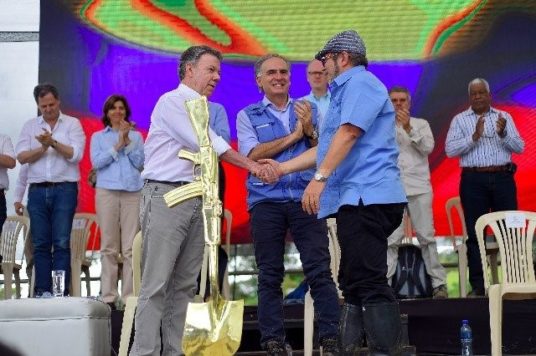
|
|
On Tuesday, UN monitors announced that they successfully collected more than 7,000 weapons from the FARC. This action meets the last deadline on the disarmament calendar established by November’s Peace Agreement. More than 800 arms caches remain hidden throughout the country, however, and UN monitors warn that emptying these could take months due to remaining opposition to the peace deal, lack of trust, and a lack of infrastructure. Despite these constraints, the UN Deputy Secretary General for Political Affairs said that the UN Security Council is optimistic regarding the progress of the process. Both President Santos and FARC leader Rodrigo Londoño – known as Timochenko – welcomed the announcement. Many are concerned that if the disarmament process delays, these arms could fall into the hands of other violent non-state groups. Comment: The FARC’s disarmament is a key condition for the implementation of the Peace Agreement between the rebel group and the Santos government, seeking to end more than five decades of conflict. Criticism from FARC leaders regarding the lack of amnesty for FARC prisoners, recent attacks by other violent non-state groups, and the killing of protestors by police forces demonstrate the fragility of the Peace Agreement’s successful implementation.(La Nacion, El Espectador, El Tiempo 1, 2, El Nuevo Herald 1, 2, BBC News, The Guardian)
|
|
|
|
|
| |
VENEZUELA: Tensions rise throughout the country
Tensions escalated in Venezuela this past week. On Monday night, the coastal city of Maracay experienced particularly severe looting. Police used tear gas on protesters and detained 200 people. On Tuesday, President Maduro gave a speech warning that he and his supporters are willing to take up arms if his government is overthrown. Violence broke out Tuesday evening in the opposition-controlled National Assembly when the National Guard and pro-government crowds stormed into the building and clashed with lawmakers, injuring two members of parliament. Shortly afterwards, a rogue police officer named Oscar Pérez piloted a helicopter towards the Supreme Court and the Interior Ministry in Caracas, dropping grenades and firing shots. Reports claim that nobody was hurt. Pérez later released a video calling Venezuelans to rise up against the Maduro government. While Maduro described it as a “terrorist attack”, opposition members accuse the president of staging the attempted coup as an excuse to use force. Comment: The political and economic crisis in Venezuela has led to almost daily protests. Tensions have been growing with the approach of the June 30 vote for a new National Constitution. According to the chief prosecutor’s office, more than 70 people have been killed in protest-related violence since April 1. (El Universal, El Deber, El Comercio, El Nuevo Herald, Reuters, BBC News, 1, 2, The Guardian)
Researched/Written by Nastasia Stipo
|
|
|
|
|
| |
|
This week in East Asia & Pacific
|
|
|
|
| |
CHINA: Government releases activist Liu Xiaobo for medical parole
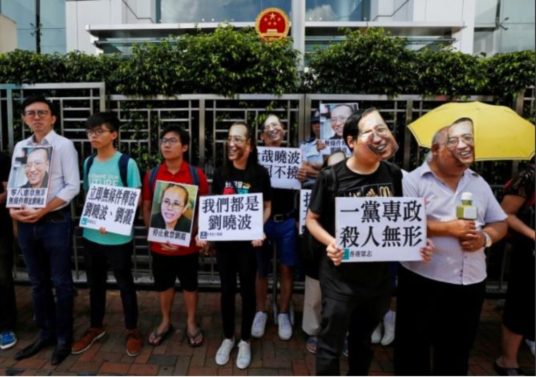
|
|
On Monday, the Chinese government released Nobel Peace laureate and activist Liu Xiaobo from a Chinese prison in Jinzhou province on medical parole. His release was prompted by his late-stage liver cancer while serving an 11-year sentence for “inciting subversion of state power.” Despite assurances of quality treatment from the Chinese government, Liu’s wife has reported that his cancer is incurable. The United States, Amnesty International, the Nobel Laureate committee and other activists have called for his immediate release to receive medical treatment abroad. Comment: Liu Xiaobo participated in several nonviolent protests since Tiananmen Square in 1989. He was sentenced to 11 years in prison in 2009 after advocating for human rights and political reform in the manifesto, “Charter 08.” He was awarded the Nobel Peace Prize in 2010 for his “long and nonviolent struggle for fundamental human rights in China.” (CNN, South China Morning Post, New York Times)
|
|
|
|
|
| |
MONGOLIA: General Election Committee declares run-off election
On Tuesday, Mongolia’s General Election Committee announced that a second run-off election will be held on July 9th after none of the three presidential candidates running secured a majority of votes during the first election on Monday. More than 1.3 million Mongolian citizens cast votes in the first round. Khaltmaa Battulga of the Democratic Party won the first round, with 38.1 percent of the ballot. Miyegombyn Enkhbold of the ruling Mongolian People’s Party secured 30.1 percent of total votes. Comment: Major issues in Mongolia’s seventh presidential election include the country’s looming budget deficit and the growing influence of Chinese investment. The candidate that obtains the absolute majority in the run-off election will become the fifth president of Mongolia. (Nikkei Asian Review, Reuters, South China Morning Post)
|
|
|
|
|
| |
MYANMAR: Military arrests three reporters for “unlawful association” with rebel group
On Monday, three Myanmar reporters were arrested and charged under a colonial-era law for “unlawful association” with the ethnic armed group Ta’ang National Liberation Army while covering the groups’ activities in Myanmar’s northeastern Shan State. Reporters were from the bilingual media outlets Democratic Voice of Burma and the Irrawaddy. Under the Unlawful Association Act, the journalists will face up to three years in jail if convicted. Comment: The Unlawful Association Act, according to Amnesty International, dates back to British colonial rule in Myanmar before 1948 and has been used arbitrarily by authorities to arrest and detain citizens, particularly those of certain religious and ethnic backgrounds. Even though Myanmar began its transition from military rule to a democratic government in 2011, Myanmar media has grown increasingly concerned with the prosecution of free speech ever since the State Counsellor of Myanmar, Aung San Suu Kyi, came to power in April 2016. (Channel News Asia, Frontier Myanmar, The Irrawaddy, Amnesty International)
Researched/Written by Laura Bisbee
|
|
|
|
|
| |
|
This week in Europe & Central Asia
|
|
|
|
| |
ALBANIA: Socialist Party set to win majority in Parliament
On Monday, preliminary results from Albania’s general election showed the ruling Socialist Party securing the majority, with 73 of 140 possible seats in parliament. Socialist Party leader and current Prime Minister Edi Rama is a staunch supporter of joining the European Union and has pledged to boost Albania’s economy and overhaul the judicial system as per EU membership requirements. Rama has said formal EU talks could begin by the end of the year. Comment: In addition to having the lowest voter turnout since the 1990’s, this election differed from previous ones in that it was largely nonviolent. As noted by more than 400 international election observers, Albania has a history of violent and contested elections. (Balkan Insight 1, 2, Politico, Al Jazeera, Reuters)
|
|
|
|
| |
CYPRUS: Peace talks reopen in Switzerland
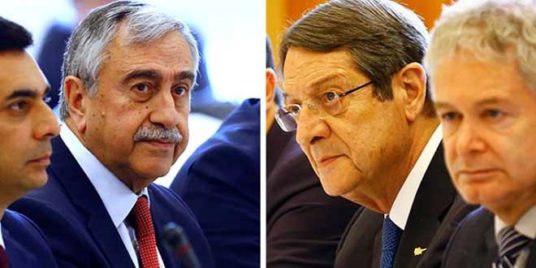
|
|
On Wednesday in Switzerland, Turkish Cypriot leader Mustafa Akinci and Greek Cypriot President Nicos Anastasiades met with diplomatic delegations from guarantor states Turkey, Greece, and Britain, to begin negotiations to settle the longstanding island territorial dispute. The top issue during the discussions is security, and the UN has announced that if these peace talks fail, the island’s 50-year long UN peacekeeping operation (UNFICYP) will come to an end. Comment: Akinci and Anastasiades have been involved in reunification talks since May 2015. Many Turkish and Greek Cypriots, such as the group “Unite Cyprus Now,” see these talks as a last chance for peaceful unification of the island. On Thursday, Greek Foreign Minister Nikos Kotzias said the Turks were refusing to negotiate their positions, while Turkish Foreign Minister Mevlut Cavusoglu said the discussions were productive and will continue. (The Cyprus Weekly, Daily Sabah, The Guardian, ABC, Reuters, UN Cyprus Talks)
|
|
|
|
|
| |
SPAIN: Anti-terror operation shuts down suspected IS cell in Mallorca
On Wednesday, a two-year long multinational operation ended with six individuals being arrested and detained in Spain, Germany, and the UK for allegedly fundraising and recruiting fighters for the self-proclaimed Islamic State (IS). The Spanish National Police have disclosed that the detained individuals include a UK-based imam already known to British and European security services, and a man in Germany who has taken part in the production of IS propaganda videos. Comment: An investigation by Spanish authorities found that the group’s supporters were growing as a result of secret weekly meetings and an increase of extremist ideology spread on social media. Spain’s national threat levels have been at the second highest level (4 out of 5) since 2015. (The Local, El Pais, CNN, BBC, NZ Embassy)
|
|
|
|
|
| |
UKRAINE: Massive cyber attack hits Ukraine, spreads across globe
| |
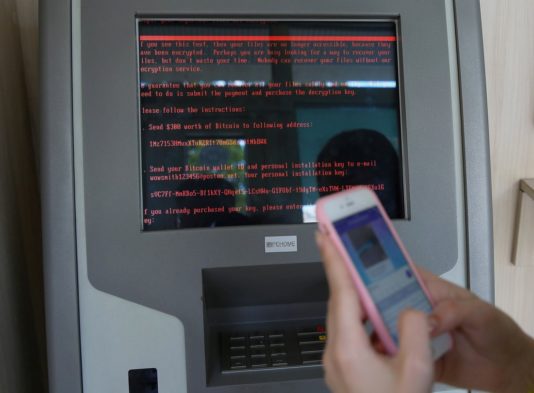
|
On Tuesday, ransomware dubbed “Petya” or “GoldenEye” crippled ports, Kyiv’s main airport, the national power grid, and banks in Ukraine, before spreading to multiple other countries around the world. The malware began infecting computers in Ukraine after users downloaded a popular program or visited a local news site, locking the machines and demanding a ransom in bitcoin in exchange for the stolen data. The virus also disrupted businesses in Russia, Poland, Italy, Denmark, France, Australia, the UK, the United States, and others. Comment: The source of the attacks, their purpose, and the extent of the damage, is still unclear. Interpol, the U.S. Department of Homeland Security, and other cyber security experts are working together to closely monitoring the attack. Ukraine has blamed Russia for past cyber attacks, which Russia has denied. Companies in Russia were the second largest targets of this attack. (Ukraine Today, DW, NPR, Reuters RFE/RL)
Researched/Written by Natalie A. Landau
|
|
|
|
|
| |
|
This week in the Middle East & North Africa
|
|
|
|
| |
LIBYA: UN convoy released following hours of detention by gunmen in Al-Zawiya
On Wednesday, a convoy including six members from the United Nations Special Mission in Libya (UNSMIL) was freed after hours of detention by gunmen in Al-Zawiya. The gunmen abducted the UN personnel to trade them for fighters arrested by the Government of National Accord in Tripoli, but notables from Al-Zawiya city intervened and persuaded the gunmen to release the UNSMIL members unharmed, despite not answering their demands. Comment: Libya experienced extensive turmoil after the 2011 civil war and is now ruled by rival governments and armed groups. (The Libya Observer, Libya Al-Mostakbal, El-Watan News, The Washington Post, Daily Mail)
|
|
|
|
|
| |
QATAR: US Secretary of State meets his Qatari counterpart over Qatar crisis
On Tuesday, US Secretary of State Rex Tillerson met Qatar’s Foreign Minister Mohammed bin Abdulrahman Al Thani to discuss the Gulf rift. The Qatari Foreign Minister condemned the Saudi refusal to negotiate their demands to end the blockade on Qatar and stated that other Gulf countries, “Must be genuinely willing to negotiate and to present evidence to support their allegations and demands.” Comment: On Friday, Saudi Arabia and its Arab allies involved in the crisis gave Qatar a 13-point list of demands to be met within 10 days to end the boycott. The list includes shutting down the news network Al Jazeera. (Al-Arabiya, Gulf Times, BBC)
|
|
|
|
|
| |
SYRIA: UN High Commissioner for Human Rights urges protection of 100,000 civilians trapped in Raqqa
On Wednesday, in a statement released by the OHCHR in Geneva, the United Nations High Commissioner for Human Rights, Prince Zeid Ra’ad al-Hussein, expressed grave concerns and urged all world powers involved in the fight against the self-proclaimed Islamic State (IS) to spare the lives of 100,000 civilians trapped in the city. Prince Zeid called on all parties involved in combating IS to enact measures allowing civilians who wish to flee Raqqa to do so safely. Comment: According to the UN, more than 173 civilians have been killed in operations against IS in Raqqa since the beginning of this month. (Asharq Al-Awsat, Reuters, UN News Centre)
Researched/Written by Atika Alkhallouf
|
|
|
|
|
| |
INDIA: Protests against recent anti-Muslim attacks
| |
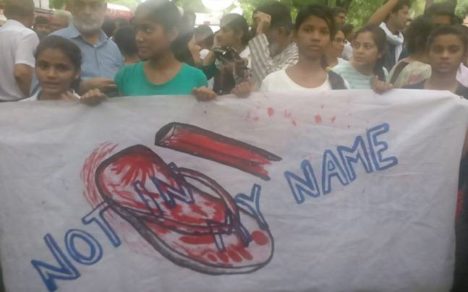
|
On Wednesday, demonstrations were held across India protesting attacks on Muslims accused of killing cows or consuming beef. The movement gained traction on social media through #NotinMyName and urged the cessation of violence in the name of religion. Protests branched out of India into London, Toronto, and Boston on Thursday. The protests follow two recent incidents: the fatal stabbing of 16-year-old Junaid Khan on a Mathura-bound train and the beating as well as house-burning of a man in Jharkhand state. Both individuals were accused of possessing beef or slaughtering a cow. Khan’s village of Khandwali mourned his loss and wore black armbands in silent protest during Eid celebrations on Monday. Comment: Many religious Hindus consider cows to be sacred and some Hindu nationalists promote prohibitions against slaughtering cows, even for non-Hindu citizens. According to Reuters, Hindu nationalists have injured 124 Indians in beef-related incidents since 2010. Of the 28 Indians killed in such incidents, 24 were Muslim. (India Today 1, 2, The New Indian Express, Reuters)
|
|
|
|
|
| |
NEPAL: Millions vote in second phase of local elections
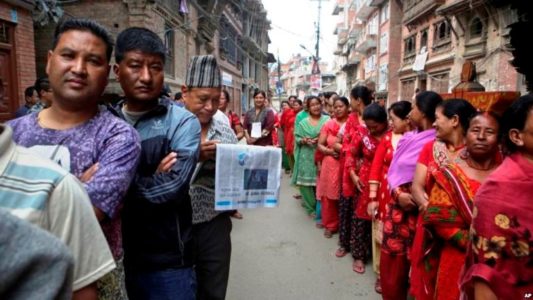
|
|
On Wednesday, Nepal held its second round of local elections with a 70.5 percent voter turn-out. Last month, three provinces held their elections with a 70 percent voter turn-out. Three provinces are currently holding elections with another province holding an election in September. More than 162,000 security forces have been deployed to voting areas, but no major problems have been reported. The final province is facing discontent from the ethnic Madhesis, encouraging a boycott of the elections until their demand for more territory is met. Comment: This is the first set of local elections in two decades and a landmark event in Nepal’s transition from a monarchy to democracy. The last local representatives were elected in 1997; upon expiration of their term, the Maoist insurgency took root. These elections will lead to provincial and national elections to be held in January 2018. After the new constitution was ratified, protests led by Madhesis resulted in over 50 deaths. (India, DailyMail, Al Jazeera, ABC, Reuters)
|
|
|
|
|
| |
PAKISTAN: Series of terrorist blasts in Parachinar and Quetta raise border security concerns
On Friday, twin blasts were set off in Parachinar and another bombing took place in Quetta. The first blast took place in Turi Market, which was filled with shoppers preparing for Eid celebrations. The second blast followed shortly after as people rushed to help the initial victims, leaving at least 67 dead and 200 wounded. Lashkar i Jhangvi has claimed responsibility for the attacks. The Quetta bombing took place in front of the Balochistan police inspector general’s office in Shuhada Chowk, injuring 20 and killing 14, including seven police officers and one leader of a Sunni political party. Though the attacks were credited to different terrorist organizations, Pakistani Interior Minister Chaudery Nisar Ali Khan claims that opened crossing points on the Pakistan-Afghanistan border have led to increased acts of terrorism. Military officials have announced heightened security measures on sanctuaries across the border. Comment: After the bombing in Parachinar, relatives of the victims and area residents continue a sit-in protest with Thursday marking its seventh day. They demand that the Chief of Army Staff and Interior Minister visit the area. (Khyber News 1, 2, 3, Dawn News 1, 2, Al-Jazeera, Washington Post)
Researched/Written by Rabia Uddin
|
|
|

|
|